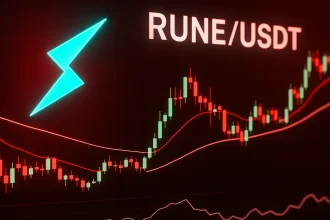As we stand on the precipice of 2026, the cryptocurrency landscape is a battleground where innovation clashes with regulation, and the stakes have never been higher. The recent passage of the GENIUS Act by the U.S. Senate marks a pivotal moment, signaling a governmental shift towards embracing digital assets. However, this legislative milestone is but one piece of a complex puzzle that includes market volatility, political entanglements, and the ever-present specter of financial scandals.
The GENIUS Act: A Double-Edged Sword
The Guiding and Establishing National Innovation for U.S. Stablecoins Act, or GENIUS Act, represents a significant step towards legitimizing stablecoins within the financial ecosystem. By mandating that these digital assets be backed by liquid reserves and subject to regular audits, the Act aims to instill confidence among investors and consumers alike. Yet, this regulatory embrace is not without its detractors. Critics argue that the Act may inadvertently stifle innovation by imposing stringent requirements that favor established players over emerging startups. Moreover, the bipartisan support for the Act raises questions about the influence of political agendas on the ostensibly decentralized world of cryptocurrency.
Market Volatility: The Unpredictable Tide
Despite regulatory advancements, the cryptocurrency market remains as volatile as ever. Bitcoin, the bellwether of digital currencies, has experienced significant fluctuations, with prices dipping below $105,000 in early November. This downturn is not isolated; major cryptocurrencies like Ethereum and Solana have also seen substantial declines. Analysts attribute this turbulence to a confluence of factors, including macroeconomic uncertainties and shifts in investor sentiment. The Federal Reserve’s recent policy decisions have further compounded the situation, underscoring the delicate interplay between traditional financial institutions and the burgeoning crypto market.
Political Entanglements: The Trump Factor
Adding another layer of complexity is the active involvement of political figures in the cryptocurrency arena. President Donald Trump’s endorsement and promotion of the $TRUMP meme coin have blurred the lines between political influence and financial markets. While some view this as a bold move towards mainstream acceptance of digital assets, others see it as a potential conflict of interest that could undermine the credibility of both the presidency and the cryptocurrency market. The establishment of the Strategic Bitcoin Reserve further exemplifies this entanglement, raising questions about the role of government in a domain that was originally conceived as a decentralized alternative to traditional finance.
Scandals and Setbacks: A Cautionary Tale
The recent Czech government Bitcoin scandal serves as a stark reminder of the risks inherent in the crypto space. The acceptance of a substantial Bitcoin donation from a convicted criminal by the Ministry of Justice not only led to high-profile resignations but also cast a shadow over the integrity of governmental institutions. This incident underscores the urgent need for robust regulatory frameworks that can prevent such ethical lapses and protect investors from potential malfeasance.
Looking Ahead: A Call for Balanced Progress
As we navigate this intricate landscape, it is imperative to strike a balance between fostering innovation and implementing effective regulation. The GENIUS Act, while a step in the right direction, must be continually assessed to ensure it does not hinder the growth of the crypto industry. Market participants must remain vigilant, recognizing that volatility is an inherent characteristic of this nascent market. Political figures should exercise caution, ensuring that their involvement does not compromise the principles of decentralization that underpin the cryptocurrency movement. Ultimately, the path forward requires a collaborative effort from regulators, innovators, and investors to build a resilient and trustworthy digital financial ecosystem.






